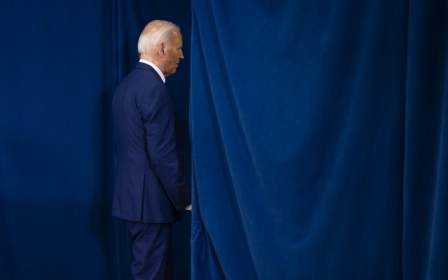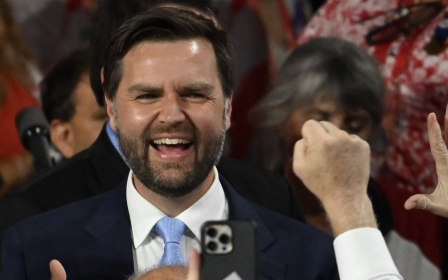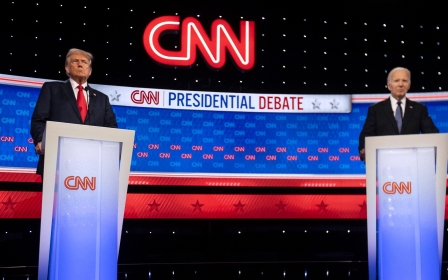Searching for a Kamala Harris Middle East policy beyond her pro-Israel record
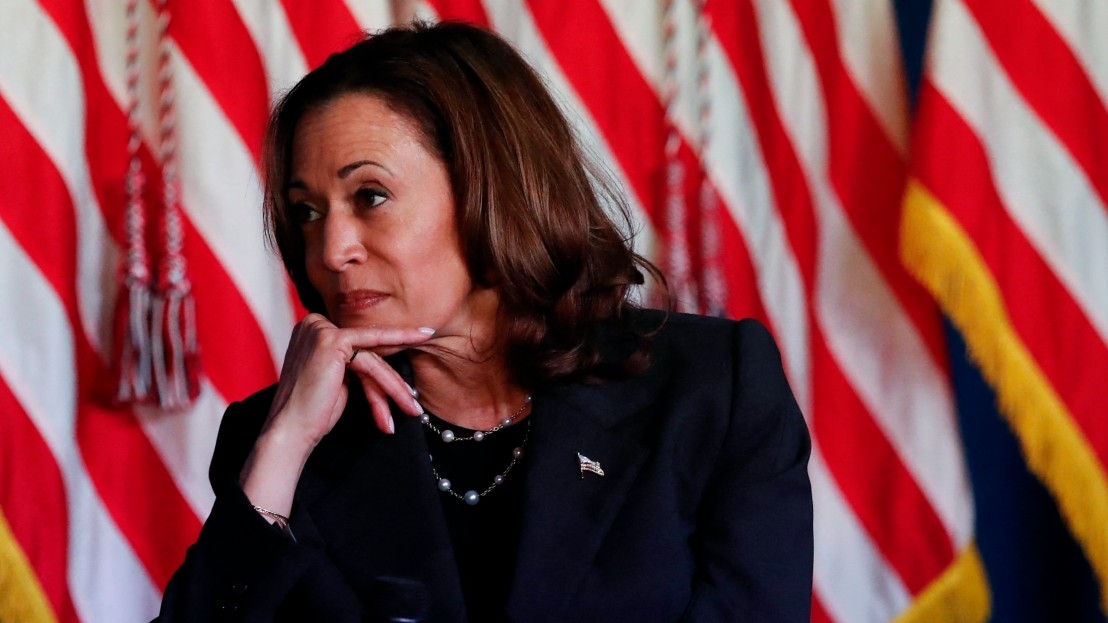
US President Joe Biden's announcement to drop out of the presidential race has propelled Vice President Kamala Harris into the contest as the Democratic candidate to stave off the formidable challenge from former President Donald Trump.
Some progressive activists have pointed to her softer rhetoric in support of Israel and her decision not to be present at Israeli Prime Minister Netanyahu’s address to Congress as a sign that she could be more swayed by pro-Palestinian demands for Israel to accept a ceasefire and for the US to end weapons sales to Israel.
However, former US officials under Democratic administrations have said, that given her role as President Biden's second-in-command - her campaign for president has already been marketed as a continuation of Biden's legacy - Harris is likely to maintain the existing status quo when it comes to foreign policy.
"She may be a more energetic player but one thing you shouldn't expect – any immediate big shifts in the substance of Biden's foreign policy," Aaron David Miller, a former Middle East negotiator for Democratic and Republican administrations, told Reuters in an interview.
A deeper look into Harris' political career paints the picture of a politician that rides the waves of popular currents in the country, rather than having a unique political vision. Nowhere more stark is this lack of vision than in her comments regarding the Middle East.
New MEE newsletter: Jerusalem Dispatch
Sign up to get the latest insights and analysis on Israel-Palestine, alongside Turkey Unpacked and other MEE newsletters
Staunchly pro-Israel with softer tone on Gaza
Harris has already shown that if president, she will take a markedly different tone on the Israel-Palestine conflict from President Joe Biden, a self-declared Zionist. Since the start of Israel's war on Gaza, Biden has denied the Palestinian death toll, peddled unverified reports that babies in Israel were beheaded by Hamas fighters, and made several other statements that uncritically accept Israel's state narrative on the conflict.
The vice president has largely stayed close to Biden's approach to Israel. But in March, she gave a speech which criticised Israel's disruption of humanitarian aid flow into Gaza.
“Given the immense scale of suffering in Gaza, there must be an immediate cease-fire," Harris said, pausing for a brief moment to collect huge applause before tempering expectations and adding: "at least for the next six weeks".
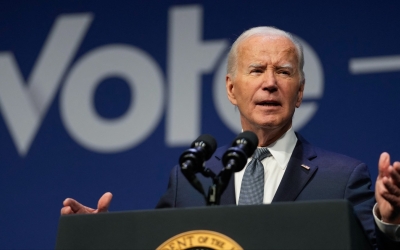
A large swathe of the Democratic Party has been participating in the pro-Palestine protests in the US, in which they have been calling for a permanent ceasefire in Gaza. It's not clear what the intention of the pause in her sentence was, but it shows that Harris is aware of where voters stand when it comes to the war on Gaza.
James Zogby, president of the Arab American Institute, told the Wall Street Journal that he spoke with Harris in October, and she appeared to show "far greater empathy" than Biden, who has been dismissive of pro-Palestinian voices.
But rhetoric doesn't equal policy change, and despite a huge swell of pro-Palestinian sentiment among the Democratic Party's voters, Harris has not made any public suggestions that she would be swayed by that sentiment.
On the other hand, Harris and those close to her have indicated that she will remain a staunch supporter of Israel.
On 24 July, as Israeli Prime Minister Benjamin Netanyahu was speaking to US Congress, Doug Emhoff, Harris' husband, spoke on a Zoom call hosted by the Jewish Democratic Council of America (JDCA) and Jewish Women for Kamala.
“Let me just make this clear: The vice president has been and will be a strong supporter of Israel as a secure democratic and Jewish state, and she will always ensure that Israel can defend itself, period. Because that’s who Kamala Harris is,” Emhoff said.
On that call was JDCA CEO Hailey Soifer, who previously served as Harris' national security advisor when the vice president was a senator in California.
'More Aipac than J Street'
Harris' worldview of Israel can also be linked to the larger story of mega-donors and special interest groups in American electoral politics.
She has been endorsed as the Democratic nominee for president by J Street, the liberal Zionist lobbying group that opposes the American Israel Public Affairs Committee, the largest pro-Israel lobbying group in the US.
At the same time, she has kept relations with the Aipac, and met with Aipac leadership in 2019, at a time when the major Democratic frontrunners in the primary election chose to stay away from the pro-Israel group.
'The vice president has had an unwavering commitment to the security of Israel'
- Aide to Kamala Harris
Harris has also been backed by the Democratic Majority for Israel, another large pro-Israel lobbying group that has attacked progressive lawmakers for not supporting Israel enough.
These ties to Aipac and DMFI come as the two lobbying groups have been accused by progressives of "accelerating a right-wing shift" in Israel.
She has even been previously described as "more Aipac than J Street" in terms of her voting record on Israel. For example, in 2017 on her first foreign policy vote as a US senator, she voted to criticise former US President Barack Obama's refusal to veto a UN resolution that censured Israel's settlements in the occupied West Bank.
In 2017, she met with Israel's Netanyahu a week before 10 other Democratic senators wrote a letter demanding the Israeli leader halt the demolition of a Palestinian village in the West Bank.
In one of the clearest signs pointing to the fact she will continue the status quo on Israel, including maintaining military aid, a Harris official told Jewish Insider that "the vice president has had an unwavering commitment to the security of Israel. That remains true today".
“Since Oct 7, she has been deeply engaged with Israeli officials as part of our administration’s support for Israel as it works to eliminate the threat of Hamas,” the aide said.
Foreign policy gaps
While questions remain about what approach Harris will take to the US-Israel relationship and the approach to the plight of Palestinians, even less is understood about what her personal views are regarding other issues in the Middle East.
When most Democrats were growing more critical of Saudi Arabia in the wake of the killing of columnist and US resident Jamal Khashoggi, Harris joined in the demands for questions from the administration of Donald Trump.
She also became a reliable Senate vote on resolutions aimed at ending US support for the war in Yemen led by Saudi Arabia and the United Arab Emirates.
However, in the time that the Biden administration has come into office, the Democrats' tone on Saudi Arabia has pivoted as Biden has tried to secure a normalisation agreement between Riyadh and Israel.
The Biden administration had also tried to reenter negotiations to return to the Iran nuclear deal that Trump left in 2018. However, talks have stalled since last year and are unlikely to be going anywhere for the remainder of Biden's term.
Harris was supportive of the Iran nuclear deal and criticised Trump's withdrawal, but it's unclear what her approach to the issue would be.
A draft of the Democratic Party platform for 2024 seen by Middle East Eye doesn't help provide many answers either, with the platform mostly listing out purported accomplishments by the Biden administration while attacking Trump.
After holding a meeting with Israel's Netanyahu on Thursday, Harris said she would "not be silent" on the suffering going on in Gaza while in the same address stressing Israel has every "right to defend itself" against Hamas.
The words highlight that Harris is either still formulating her own path forward on foreign policy, or she will continue the path of Biden and the Democratic Party's pre-established guidelines on dealing with Israel.
Middle East Eye delivers independent and unrivalled coverage and analysis of the Middle East, North Africa and beyond. To learn more about republishing this content and the associated fees, please fill out this form. More about MEE can be found here.


